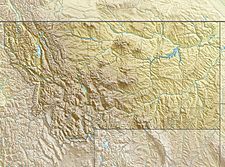Carter Glaciers facts for kids
Quick facts for kids Carter Glaciers |
|
|---|---|
| Type | Mountain glacier |
| Coordinates | 48°53′09″N 114°02′29″W / 48.88583°N 114.04139°W |
| Area | Total of 50 acres (20 ha) in 2005 counting separate ice bodies |
| Length | .30 mi (0.48 km) |
| Terminus | Moraine and talus |
| Status | Retreating |
The Carter Glaciers are a group of small ice bodies located in the beautiful Glacier National Park in Montana, USA. These glaciers are found high up on a ridge, just east of the Continental Divide. They are special because they are not one big glacier, but several smaller pieces of ice.
Contents
Discovering the Carter Glaciers
The Carter Glaciers are named after their location in Glacier National Park. This park is famous for its stunning mountains and, of course, its glaciers. These ice formations are important parts of the park's natural environment.
Where are the Carter Glaciers?
You can find the Carter Glaciers on a ridge in Glacier National Park. This ridge is just to the east of the Continental Divide. The Continental Divide is like a giant line across North America. It separates the rivers that flow to the Pacific Ocean from those that flow to the Atlantic Ocean. The glaciers sit mainly below an unnamed mountain peak that reaches about 9,164 feet (2,793 m) high.
How Big are They?
The Carter Glaciers cover a total area of about 50 acres (0.20 km2). This is roughly the size of 38 football fields! They are located at very high elevations, between 8,500 feet (2,600 m) and 7,200 feet (2,200 m) above sea level.
The Carter Glaciers are actually made up of three or four separate, smaller pieces of ice. These small pieces are sometimes called "glacierets." A true, active glacier is usually considered to be at least 25 acres (0.10 km2) in size. Since each of the Carter Glaciers is smaller than that, they are considered remnants, or what's left of larger glaciers.
What's Happening to Them?
Like many glaciers around the world, the Carter Glaciers are currently retreating. This means they are shrinking and getting smaller over time. Scientists study these changes to understand more about our planet's climate.


